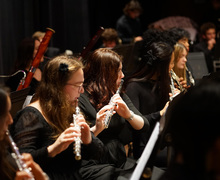Newhouse School holds forum in response to hate crimes
Kaizhao (Zero) Lin | Copy Chief
Students and faculty gathered in the Joyce Hergenhan Auditorium for the forum, which began at 1 p.m.
The S.I. Newhouse School of Public Communications held an open forum Friday afternoon in response to the series of hate crimes that occurred on and around Syracuse University’s campus this past week.
Students and faculty gathered in the Joyce Hergenhan Auditorium for the forum, which began at 1 p.m. Hub Brown, associate dean for research, creativity and diversity at Newhouse, announced the forum Thursday in a campus-wide email.
“The events of last week have left many in our community shaken,” Brown said in the email. “We want you to know that we support you and that this is your home.”
Racial slurs against black and Asian people in Day Hall were reported to the Department of Public Safety on Nov. 7. Racist graffiti in a Physics Building bathroom was reported to DPS on Wednesday night. The next day, a swastika was found written in the snow near the 505 on Walnut. Later Thursday night, DPS alerted students about writing in Day Hall that targeting Asian people.
Hub opened the floor to students and faculty, who expressed concerns over the current state of diversity and inclusion efforts within Newhouse curriculum. Attendees asked questions about what measures the school is taking to address these issues.
One student cried as she said, that in all her years at Newhouse, she has yet to have a professor of color. Brown said Newhouse is committed to conducting a more diverse faculty search.
Faculty members acknowledged that SU needs to devote more resources to faculty diversity training. Professor Harriet Brown pointed out that faculty are not required to attend diversity and inclusion training sessions, an action she said needs to be taken by the university administration.
Maranie Staab, a Newhouse graduate student, said students are coming to SU with narrow-minded views. She asked what the school should do to encourage these students to challenge their views.
“It’s great that we’re all here, but we’re not the people who need to be here,” she said. “There needs to be this dialogue.”
Harriet said it’s a long process to encourage students to have difficult conversations.
“Along the way, a few of them start to get it,” she said. “It’s a process that takes time, and it’s something we all need to work on. It happens one by one.
One white student asked how students should know where to go to report bias-related incidents. He pointed out that such resources are not outlined in the school’s syllabi.
Charisse L’Pree, who teaches diversity classes at Newhouse, said allies are welcome to speak on behalf of a bias-related incident they observed.
“Part of being an ally is acknowledging that if that individual is too scared to speak for themselves, at the very least hold their hand and encourage them to speak up,” she said. “You don’t have to be angry for them, but you can help them express their frustration in many different ways.”
She said that, 20 years ago, when people wrote racial slurs on walls, students of color were told to get over it.
“I applaud every student in this room or outside saying ‘No, we won’t tolerate that.’”
Elliot Lewis, a professor of broadcast and digital journalism, said there came a point during his first year at the school where he realized that, as a faculty member, he was living in a bubble.
“There are many ways in which I’m clueless to the student experience,” he said. “I want to learn more about what it is that our students experience in their time on this campus. I want to be an advocate for these issues, but I need to be more well-informed.”
Faculty and students also expressed frustration with the SEM 100 course, which they said failed to achieve the SU’s intention of fostering dialogue.
A senior choked up talking about his experiences his freshman year, and how he was fortunate to find the people who helped him continue here. He feels sorry for the students who didn’t encounter such supportive faculty and students, he said. These people and resources need to be made more available – on bulletin boards, not on the last page of the syllabus, he said.
“You only get four years here. If this is supposed to be the most pivotal time for you, where is that?” he said.
Sharif King, a graduate student, asked why SU was only looking to educate freshmen on diversity and inclusivity rather than upperclassmen and graduate students as well.
“Everyone needs to be included in the conversation,” he said. “Stop leaving grad students out. It doesn’t just start with the freshman class.”
Maggie Peng, a junior advertising major, said that faculty talking about race and diversity in the curriculum makes a difference. The school should train the faculty, but the faculty should also do their own research to learn how to teach diversity in relation to their field, she said.
Gracyn Doctor, a graduate student said she feels it is the responsibility of white students who are aware of what’s going on to educate their friends.
“Small things lead to big things,” she said. “If you are in a position to be able to affect change in your own community, you should do that.”
Published on November 15, 2019 at 6:49 pm
Contact Sarah: scalessa@syr.edu | @sarahalessan





